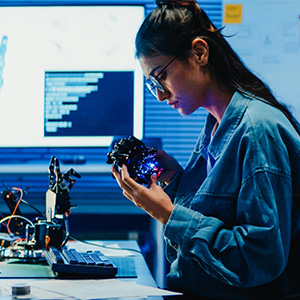A philanthropic coalition forms to back organizations shaping AI for people and communities.
A broad coalition of philanthropic leaders today announced Humanity AI, a $500 million five-year initiative dedicated to making sure people have a stake in the future of artificial intelligence (AI). As part of Humanity AI, ten of the nation’s most dynamic foundations supporting the arts, labor and work, democracy, education, and security will drive new investments toward establishing a people-driven future where AI delivers for humanity, strengthens communities, and enhances human creativity.
To address the important questions that AI is raising, the Doris Duke Foundation, Ford Foundation, Lumina Foundation, Kapor Foundation, John D. and Catherine T. MacArthur Foundation, Mellon Foundation, Mozilla Foundation, Omidyar Network, David and Lucile Packard Foundation, and Siegel Family Endowment are mobilizing philanthropy to ensure that people have a powerful voice to amplify their needs and interests, which are too often left out of discussions around AI.
As AI becomes more ubiquitous across every area of society and in people’s daily lives, it is prompting people to ask fundamental questions about their role and value in an AI-driven future. Workers are wondering whether AI will be used to replace them or enhance their performance; artists are questioning how their contributions will be valued and whether their intellectual property will be protected in a world with AI-generated art, similar to the early stages of the internet; and people are contemplating the risks that AI may pose to national security, in addition to their digital and physical safety.
“Every day, people learn more about the ways AI is impacting their lives, and it can often feel like this technology is happening to us rather than with us and for us.”
“Every day, people learn more about the ways AI is impacting their lives, and it can often feel like this technology is happening to us rather than with us and for us,” said John Palfrey, president of MacArthur. “The stakes are too high to defer decisions to a handful of companies and leaders within them. Humanity AI seeks to shift that dynamic by resourcing technologists, researchers, and advocates who are united by a shared vision of ensuring AI is a force for good, putting people and the planet first.”
Funding Priorities
Humanity AI funders have identified the following priorities and have committed to making grants in one or more these five issue areas:
Democracy
New partnerships and frameworks for AI are needed to advance and protect our democracy, and safeguard our rights and freedoms.
Education
The implementation of AI in education must be shaped around the best interests of all students, ensuring it is used as a tool that expands access to knowledge and strengthens how people learn.
Humanities and Culture
AI is not a replacement for human creativity, it is an enhancer. This means protecting artists’ and creators’ work from theft and strengthening ownership protections for the people shaping our culture and society.
Labor and Economy
From small towns to big cities, people know AI is and will continue to impact how we work. To truly have an economy that values people, our work, and enables all of us to thrive, we need to ensure AI is used to enhance how people work, rather than replace them.
Security
Innovation must not come at a cost to our safety and security. From driverless cars to automated decisions about credit and lending, we need to hold those building and deploying AI to the highest standards to protect people.
This expansive coalition will grow to include other voices addressing the social and cultural impact of AI. Humanity AI partners will begin aligned grantmaking as soon as fall 2025, driving new investments across their respective grantmaking portfolios and Humanity AI’s areas of focus.
“The message I want to resonate far and wide is this: AI is not destiny, it is design,” said Michele L. Jawando, president of the Omidyar Network. “Tech has incredible potential, but must be steered by humans, not the other way around. The future will not be written by algorithms. It will be written by people as a collective force. We are at a crossroads. The decisions we make now about who builds AI, who benefits from it, and whose values shape it will determine whether it amplifies human needs or erodes them. That future is ours to design.”
“The future will not be written by algorithms. It will be written by people as a collective force.”
Rockefeller Philanthropy Advisors (RPA) will serve as the fiscal sponsor for Humanity AI and will manage a pooled fund of grants. RPA will hire a small staff, starting with an Executive Director, who will focus on growing and supporting funder engagement and learning, and helping advance the goals of the initiative. Humanity AI will make grants from the pooled fund in 2026.
MacArthur is also hiring a Director of AI Opportunity to manage its new Big Bet Program. AI Opportunity will expand who creates, uses, and benefits from AI, with a focus on the intersection of the economy and the workforce.
Organizations interested in Humanity AI can sign up for updates, including details on how to apply for grants. Humanity AI welcomes and continues to invite additional funders to advance our mission and amplify our work in building a society where people and communities have greater opportunity and agency to shape their lives by shaping AI.





